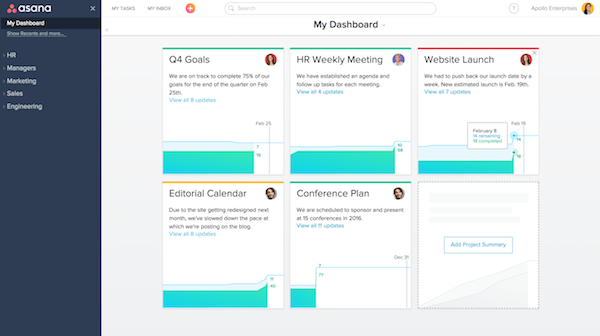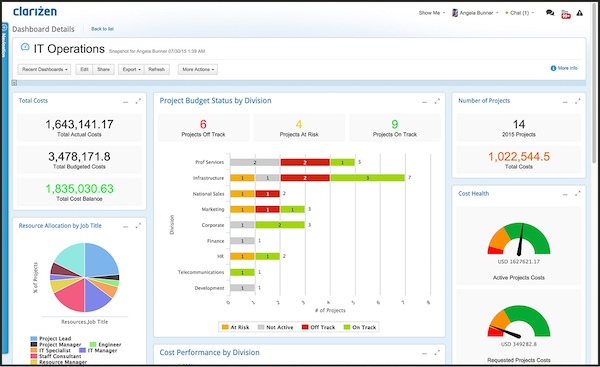Find the best Project Tracking Software
Compare Products
Showing 1 - 20 of 294 products
Sort by
Reviews: Sorts listings by the number of user reviews we have published, greatest to least.
Sponsored: Sorts listings by software vendors running active bidding campaigns, from the highest to lowest bid. Vendors who have paid for placement have a ‘Visit Website’ button, whereas unpaid vendors have a ‘Learn More’ button.
Avg Rating: Sorts listings by overall star rating based on user reviews, highest to lowest.
A to Z: Sorts listings by product name from A to Z.
eWay-CRM
eWay-CRM
CRM tools within e-Way CRM are integrated with Outlook, allowing for further use and expansion of the system. With this software, marketing is done easily and efficiently because it can assist in creating strategic plans, sending ...Read more about eWay-CRM
BugHerd
BugHerd
BugHerd is a cloud-based issue tracking and project management software solution for web developers and designers. The solution helps convert client feedback into tasks, which include all the needed changes and screenshots. With...Read more about BugHerd
Zoho Projects
Zoho Projects
Right from 2006, Zoho Projects has been a major contributor to every project management need. Automating workflows, allocating tasks, recording time logs, relaying project updates, effective team collaboration, gathering analytica...Read more about Zoho Projects
Runn
Runn
Runn is a real-time resource management platform with integrated time tracking and powerful forecasting capabilities. With visibility of your plans and business health, Runn streamlines your business and keeps your teams on the sa...Read more about Runn
Jira
Jira
Jira Software is a business process management tool used by agile teams to plan, track and release software. Jira Software supports Scrum, Kanban, a hybrid model or another unique workflow. Jira enables users to create project r...Read more about Jira
Ravetree
Ravetree
Ravetree is a cloud-based project management solution with integrated resource planning, customer relationship management and time and expense tracking capabilities. The solution helps users manage project workflows, task assignme...Read more about Ravetree
AutoPro
AutoPro
AutoPro lets entities organize their submittal log by CSI division, add shop drawings, track samples, MD, mock-ups, etc. Individuals may directly add attachments to any submittal from their computer and integrate them with sub-con...Read more about AutoPro
COR
COR
COR is a cloud-based project management tool suitable for small to midsize companies in a variety of industries. It offers modules for project management and collaboration, a client panel, invoice and quote management tools and re...Read more about COR
Cerri Project
Cerri Project
Cerri Project is an enterprise-level project and portfolio management solution which helps in managing the lifecycle of a project from beginning to end for teams of all sizes. It is available in two deployment options: hosted On-P...Read more about Cerri Project
Kantata
Kantata
The Kantata Professional Services Cloud is purpose-built to help organizations with 50 to 5000+ employees unify resource management, project management, financial management, business intelligence and team collaboration all in one...Read more about Kantata
Wrike
Wrike
Wrike is a cloud-based project management platform for teams of 20+ that is suitable for both large enterprises and SMBs. It supports remote work for various teams. This solution comes with Gantt charts, calendars, workload view f...Read more about Wrike
LiquidPlanner
LiquidPlanner
LiquidPlanner is a transformative project management solution for teams that want to plan, predict, and perform beyond expectations. It was designed to align your people, projects, and priorities to ensure the right people are wo...Read more about LiquidPlanner
Podio
Podio
Citrix Podio is a project management and social collaboration tool. It allows businesses to create custom applications to best meet unique business requirements and preferred workflow—without the need for technical skills or devel...Read more about Podio
AceProject
AceProject
AceProject is a cloud-based project management solution designed for small and midsize businesses. It offers project collaboration, time tracking, document management, budgeting, reporting and project tracking within a suite. ...Read more about AceProject
Smartsheet
Smartsheet
Smartsheet is a work execution platform and collaboration tool with a familiar spreadsheet-like interface that helps teams plan, track, and manage projects in real-time. Smartsheet features include a range of project management to...Read more about Smartsheet
Workzone
Workzone
Workzone is a project management solution that offers document management, project collaboration, customizable reporting, resource and task management and time tracking. The software is cloud-based and offers automated emailed rep...Read more about Workzone
Asana
Asana
Asana is a comprehensive project management tool that offers a range of technical features to streamline workflows and enhance collaboration within teams. With its user-friendly interface and robust capabilities, Asana provides or...Read more about Asana
InLoox
InLoox
InLoox is the modern project and portfolio management platform that enables teams and departments throughout the company to reliably plan, monitor and evaluate their projects - convenient, simple and integrated into the Microsoft...Read more about InLoox
Celoxis
Celoxis
Tired of spreadsheets posing as PPM tools? Switch to Celoxis: the all-in-one solution to streamline portfolios, optimize resources, and enhance decision-making with advanced analytics & dashboards. New: native Jira connector. Cel...Read more about Celoxis
ProofHub
ProofHub
ProofHub is a cloud-based solution for teams in numerous industries. The solution provides applications for project management, project collaboration, resource management, task management, plus more. Key features include discussi...Read more about ProofHub
Buyers Guide
Last Updated: November 21, 2023Once a project is underway, it’s essential for managers to monitor work and keep teams on track to meet deadlines. What’s more, managers must keep internal and external stakeholders up to date on the progress made against initial baselines set for the project’s scope, budget and timeline.
That’s where project tracking software comes in. Managers use project tracking tools to maintain a bird’s-eye view of project progress, track key performance metrics and report back to stakeholders.
We’ve created this Buyer’s Guide to help you understand project tracking systems and how they fit into the larger project management software market. In it, we’ll cover:
What Is Project Tracking Software?
Common Functionality of Project Tracking Software
What Is Project Tracking Software?
Project tracking tools allow managers to compare actual project metrics—such as costs, schedules and personnel—to estimates established during the planning phase. Managers then use this data to report back to stakeholders on the overall health of the project.
Tracking systems are designed to improve efficiency by automating the data-capture process. This saves time managers would otherwise spend tracking down status updates and collating that information into progress reports.
These tools are more high-level than dedicated time- or task-tracking applications, which only track one of two things: the hours accrued by employees, or the progression of tasks. Project tracking systems, on the other hand, help managers monitor overall progress—from total work completed to hours logged to budget expenditures.
The “project tracking software” category encompasses a variety of tools: from basic dashboards to advanced reporting and analytics (see next section).
Basic project tracking capabilities include:
Data capture
Dashboards/project status overview
Deadline, timeline and milestone tracking

Dashboard view in Asana
More advanced tracking systems will offer all of the above, in addition to such capabilities as:
Report generation
Summary of resource utilization (billable versus non-billable hours)
Comparisons of actual versus estimated ROI/profit margins

Dashboard screen in Clarizen
Common Functionality of Project Tracking Software
Project tracking software typically includes some or all of the following capabilities:
Dashboards | Provide an overview of current projects and their status, often highlighting impending milestones and tasks nearing their due date. Some dashboards also include an activity stream or notification center. |
Gantt charts | Also integral to project planning, Gantt charts provide visualizations of the project schedule and show task progress/completion rates. Tasks are displayed as horizontal bars across a calendar or timeline, and are shaded to represent the percentage complete. |
Reporting | Gives a snapshot of the current status of key metrics, such as ROI/profit margins, resource and budget utilization and overall project health (including identified risks and corresponding risk management plans). |
Analytics | Some systems include analytics and business intelligence capabilities, often coupled with reporting tools, that help users identify trends across teams and projects. These insights help businesses make more informed decisions in the future. |
Key Purchase Considerations
Here are a few considerations buyers should keep in mind when selecting a project tracking system:
System complexity and pricing. There are many systems with project tracking capabilities, but the pricing and depth of functionality varies considerably. For example, it’s common for vendors to include dashboard functionality in their starter packages, but offer reporting only in their mid- or top-tier packages.
Reporting features may often come at a higher price—but we know from a 2015 analysis of project management software buyers who contact Software Advice that this is actually their preferred tracking method, over dashboards and Gantt charts.
Top-Requested Project Tracking Functionality
![]()
Source: 2015 Project Management Software SMB Buyer Report
Given this, buyers should carefully evaluate their needs and choose a system with functionality that supports their workflows. Many vendors offer free trials or product demos, which allow businesses to test out a product before purchase to ensure it aligns with their processes.
Cloud-based systems. Cloud-based project management solutions are becoming increasingly popular. They offer users a number of benefits, including:
Remote access (often including native mobile apps for iOS and Android)
Lower upfront costs (since updates and system maintenance are handled by the vendor)
Manageable recurring costs (since monthly or annual subscription pricing is standard, which includes updates and maintenance costs)
Additionally, cloud solutions are typically offered in several different functional tiers. This allows businesses to purchase a system with only the capabilities necessary at the time, then scale the system as their needs change.
For project tracking, this is especially useful: Managers can start out with basic dashboard tracking, then increase their investment over time to a tier that offers Gantt charts and/or reporting and analytics.







